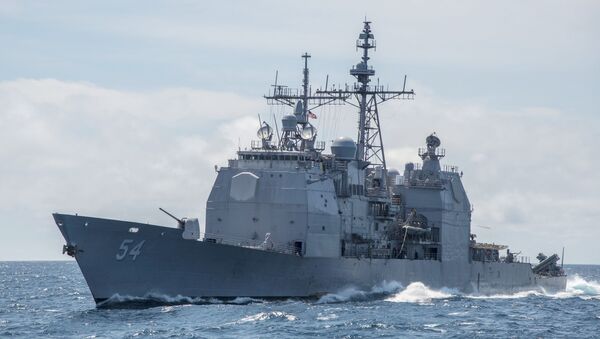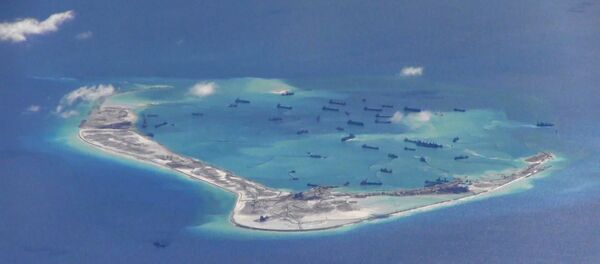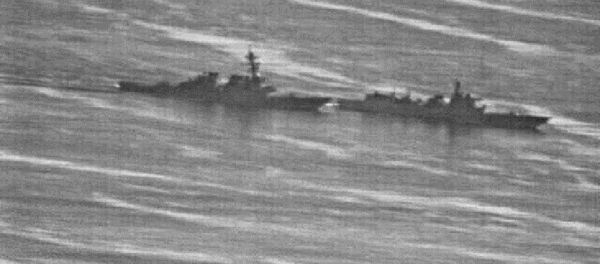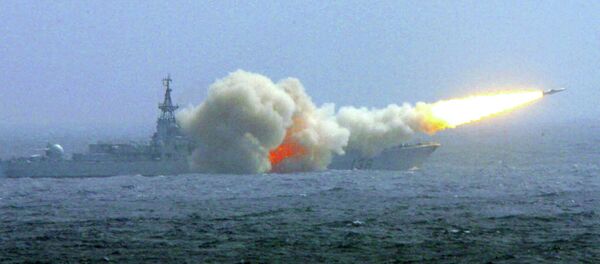In order to challenge Beijing's tenuous claims to control the vast majority of the South China Sea, the US and other nations engage in FONOPs — patrols in which they traverse waterways they claim are international. However, while these operations often lead to tense confrontations and stern warnings from People's Liberation Army Navy (PLAN) forces, top US Navy officials maintain the patrols just aren't that important to their strategy in the region and aren't intended to be provocative.
Speaking at the sixth International Maritime Security Conference in Changi, Singapore, on Wednesday, Chief of US Naval Operations Adm. John Richardson also pointed out that the US Navy hasn't increased the frequency of FONOPs, and has no plans to do so.
"I've done the analysis so that I can state with confidence that our level of operations, our presence there, has been consistent over the decades," he said. "There's nothing that has spiked recently."
"The operations get more attention in the media, and also sometimes from China, than they warrant, to be honest," Richardson said.
The adviser, who commands no US forces, noted that FONOPs "are by design non-provocative, non-escalatory. They're just challenging excessive maritime claims in a very consistent basis."
"They've been, I guess, fairly increasingly consistent in their response to these, but if I just go back to first principles… I just want to make sure that the US Navy's approach has been consistent," Richardson said. "We haven't done anything increasingly provocative or anything else."
However, Beijing doesn't agree. In February, the Chinese Ministry of National Defense blasted FONOPs as "illegal and provocative moves in the South China Sea, undermining sovereignty and security of littoral countries, and doing harm to regional peace and stability," Sputnik reported.
"China always respects the freedom of navigation and flights over the South China Sea in accordance with international law, but that should not be conducted in a wayward or illegal manner," Ministry of National Defense spokesperson Ren Guoqiang said, according to Xinhua News Agency.
Five nations other than China have also laid claim to territory in the South China Sea: Taiwan, Vietnam, the Philippines, Malaysia and Brunei. Although relatively unexplored, the seafloor beneath the waterway is believed to house large hydrocarbon deposits, including oil and natural gas. Roughly $3 trillion worth of trade transits the sea each year.
In recent years, Beijing has moved to solidify its hold on the South China Sea by expanding and fortifying many of the small islets that dot the waterway — some of which are reefs that have been artificially raised above sea level by dredging the seafloor and depositing the soil on top of the reefs. It's these artificial islands — and the territorial waters China claims around them — that draw the most ire from other countries and set the stage for FONOPs standoffs.
In one dramatic showdown last September, a US Navy destroyer and a PLAN destroyer came within a couple dozen yards of colliding, Sputnik reported.
Earlier this year, Richardson advised creating a new rulebook for US and Chinese warships in order to avoid such dramatic clashes in the future.
"[T]he Chinese navy is growing; there's going to be more opportunities where we meet," Richardson told the Atlantic Council think tank in Washington, DC, in February, "and so these rules are going to be operative more and more. We should approach each other all the way down to the tactical level, our front-line commanders, in ways that actually make it easy for us to adhere to these rules of behavior."
"So let's not be obstructing one another, driving our ships in front of one another, throwing obstacles in front of the ship. Let's just be biased towards making it easy," the adviser said.
Richardson retained that level-headed position in Singapore Wednesday, where he noted he has "a great deal of respect for how fast things can happen when it comes to China."
"This is not a zero-sum game. There is tremendous prosperity to be gained out there for all, and so we'll strive to do so in a way that everyone can grow," he said.







